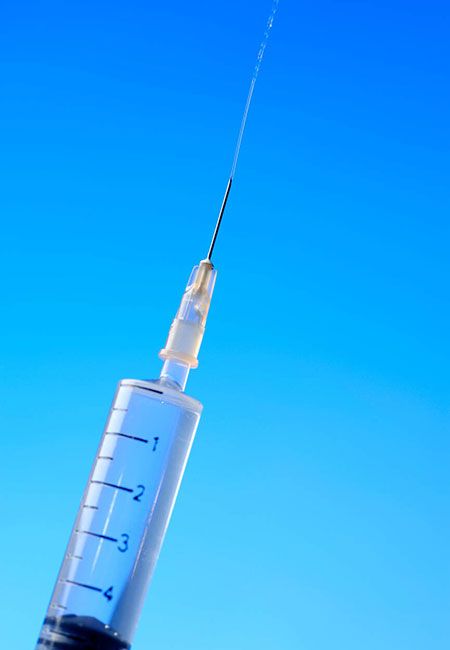56 reports of alleged needle spiking have been made to police in September and October so far, according to the National Police Chiefs' Council (NPCC).
SEE: Have you got a cold or Covid? A 23-point checklist to tell the difference
These alarming numbers have sparked fears of a worrying new trend, while they've also given rise to a nationwide conversation: what is needle spiking? How can you tell if you have been a victim of needle spiking? And what should you do if you have been spiked by a needle? We spoke to NHS GP Dr Isabella Kent for the answers.
What is needle spiking?
"The term 'needle spiking' relates to a number of incidents of people reportedly being injected with a substance without their knowledge or consent," Dr Isabella explains. Drink spiking, on the other hand, involves drugs being added to your drink when you're not aware.
What drug is used in needle spiking?
It's believed that the same drugs used to spike drinks are used in needle spiking. These include Rohypnol (roofie) or Gamma Hydroxybutyrate (GHB), also known as date-rape drugs.
How does needle spiking happen?
It's hard to grasp the idea that people wouldn’t notice an injection going in, but Dr Shirin Lakhani, a cosmetic doctor specialising in women's health, told BBC Newsbeat that some needles are so thin "you can barely feel them going in". She added: "And if someone has had a drink or so, they might be less inclined to feel the scratch of a needle."
Dr Veena Babu, a GP in London, meanwhile, added that injections in the thigh or upper arm are harder to feel, and the effects could take longer to kick in.
Why is needle spiking happening?
It's not known exactly why needle spiking has started to happen, but Superintendent Kathryn Craner of Nottingham Police said: "We do not believe that these are targeted incidents; they are distinctly different from anything we have seen previously as victims have disclosed a physical scratch type sensation before feeling very unwell. This is subtly different from feelings of intoxication through alcohol according to some victims."
SEE: How to get rid of a cold in 24 hours with these top expert tips
What are the signs you have been victim to needle spiking?
While Dr Isabella explains that it may be "tricky" to identify needle spiking if "a person has already consumed a large amount of alcohol and therefore it may be difficult to decipher whether their symptoms are alcohol-related or not", there are some symptoms that could suggest you have been a victim to needle spiking. These include:
1. Sweating
2. Headache
3. Sluggishness
4. Clumsiness
5. Drowsiness
6. Decreased reaction time
7. Impaired judgement
8. Lack of coordination
9. Aggression
10. Stomach disturbances
56 cases of needle spiking have been recorded across the UK
11. Muscle spasms
12. Speech difficulties
13. Breathing problems
14. A severe or unusually long hangover
15. Confusion
16. Vomiting
17. Loss of consciousness, out of keeping with the amount of alcohol consumed
18. Injection mark
19. Bruising at the site of injection
20. Loss of balance
21. Acting out of character
22. Nausea
23. Blurred vision
24. Dizziness
25. Tiredness
26. Hallucinations
27. Amnesia
28. Paranoia
29. Loss of balance
What to do if you have been victim to needle spiking
"If you suspect anything," Dr Isabella says. "Get to a place of safety immediately, with somebody that you trust. If you are alone, ring someone to let them know where you are. Get to a local emergency department as soon as possible. This is especially important as the sooner investigations are done (such as blood and urine tests), the higher the likelihood of picking up any possible substances that you may have been exposed to."
What is being done about needle spiking?
To date, a petition to make it a legal requirement for nightclubs to thoroughly search guests upon entry has 171,814 signatures. This will be considered for debate in Parliament.
Like this story? Sign up to our newsletter to get other stories like this delivered straight to your inbox.









